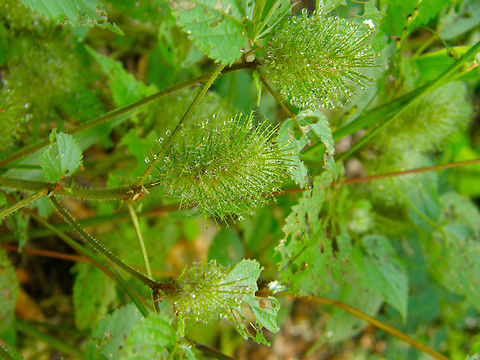
Appearance
Erect, annual herb, up to 50 cm high. Leaves 3-7 cm long, triangular to rounded-ovate, acuminate or cuspidate-acuminate, crenate. Inflorescence terminal and axillary spikes up to 5 cm long; bracts of pistillate flowers 7-9 mm long, with long hairs; fruit 2 mm long capsule.Acalypha alopecuroidea is monoecious and hermaphroditic. The incomplete, imperfect/perfect, actinomorphic flowers are arranged in staminate axillary spikes and carpellate spikes terminal and axillary. In staminate flowers the perianth has 4 green fused at the base pubescent sepals, 8 stamens and no carpel. Carpellate flowers are subtended by numerous bristles, with ovate sepals, no stamens and a superior, pubescent ovary with 3 locules and seeds. The fruit is a capsule. It grows as a glandular pubescent annual to 60 cm in height (usually lower). The leaves are arranged alternately, to 10 cm in length, ovate, with a dentate/serrate leaf margin and a cuspidate/acuminate leaf apex and cordate leaf base.
Distribution
It occurs throughout the Lucayan Archipelago as well as the Caribbean region, Mexico, Central and northern South America. It now also occurs in the southern United States.Habitat
It grows in human altered environments (yards, waste areas, abandoned fields).Uses
Extracts of A. alopecuroidea can inhibit TNFalpha-induced E-selectin production, providing a mechanistic validation of its traditional use against inflammatory diseases.References:
Some text fragments are auto parsed from Wikipedia.
https://www.tramil.net/en/plant/acalypha-alopecuroideahttps://pubmed.ncbi.nlm.nih.gov/19724926/
http://www.levypreserve.org/Plant-Listings/Acalypha-alopecuroidea
http://www.efloras.org/florataxon.aspx?flora_id=1&taxon_id=250101514
https://florida.plantatlas.usf.edu/plant.aspx?id=4070